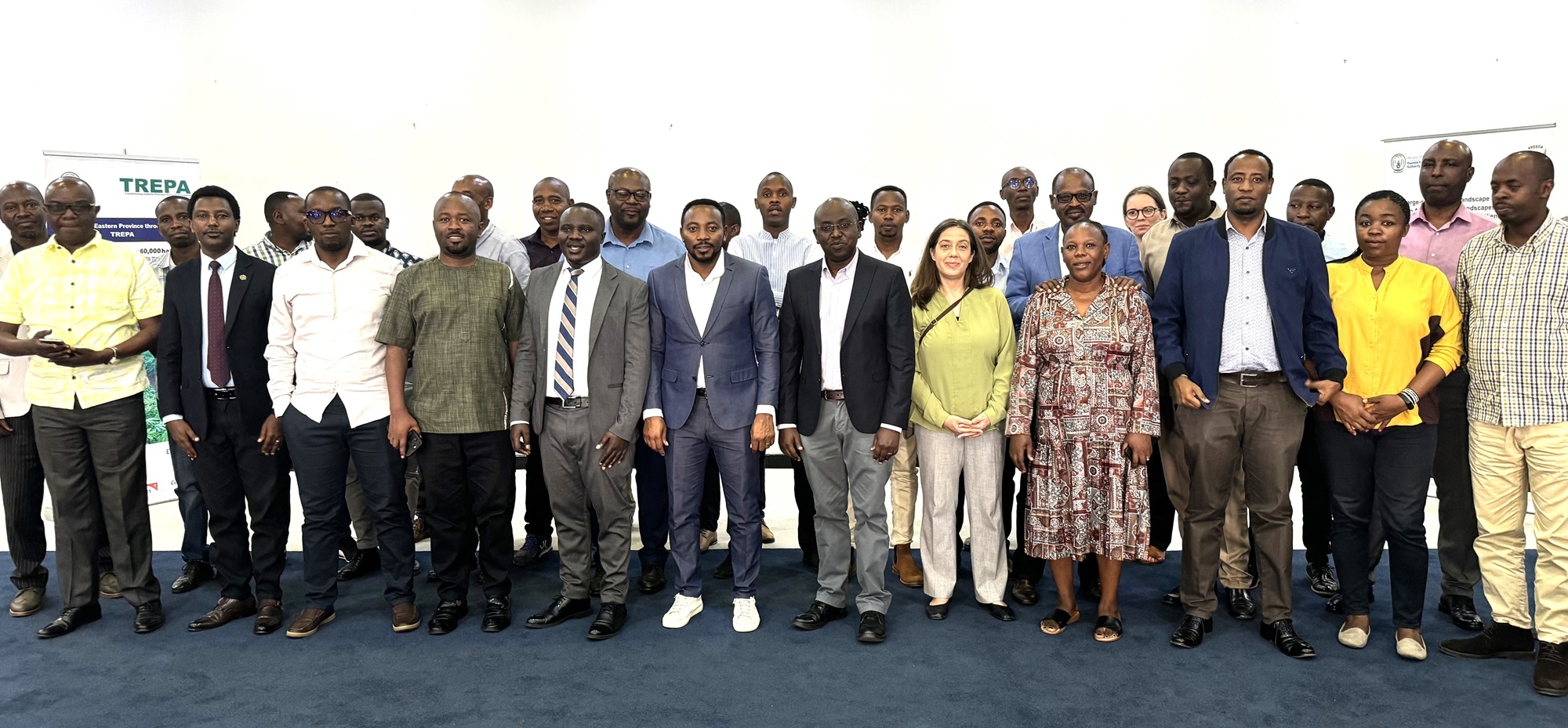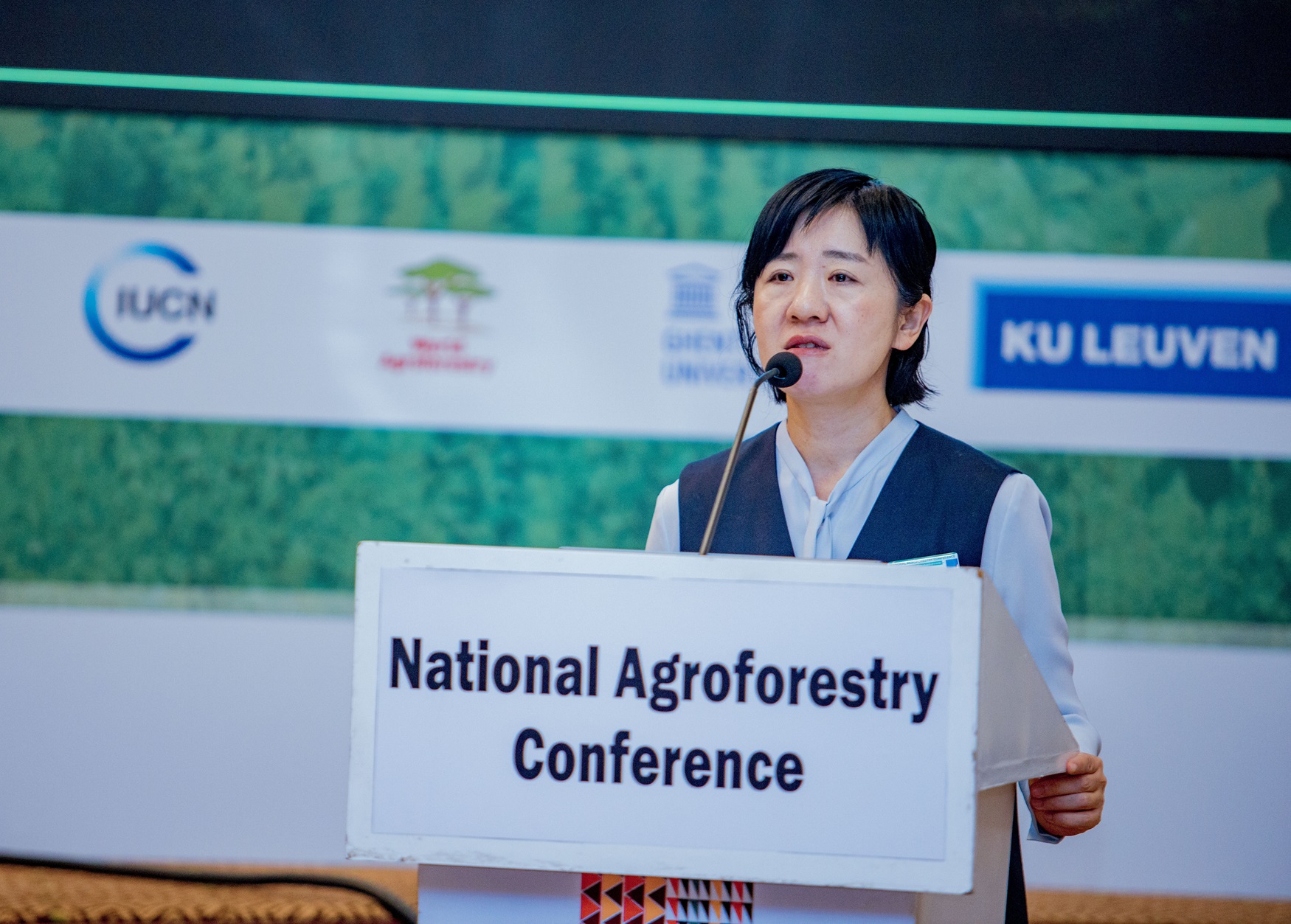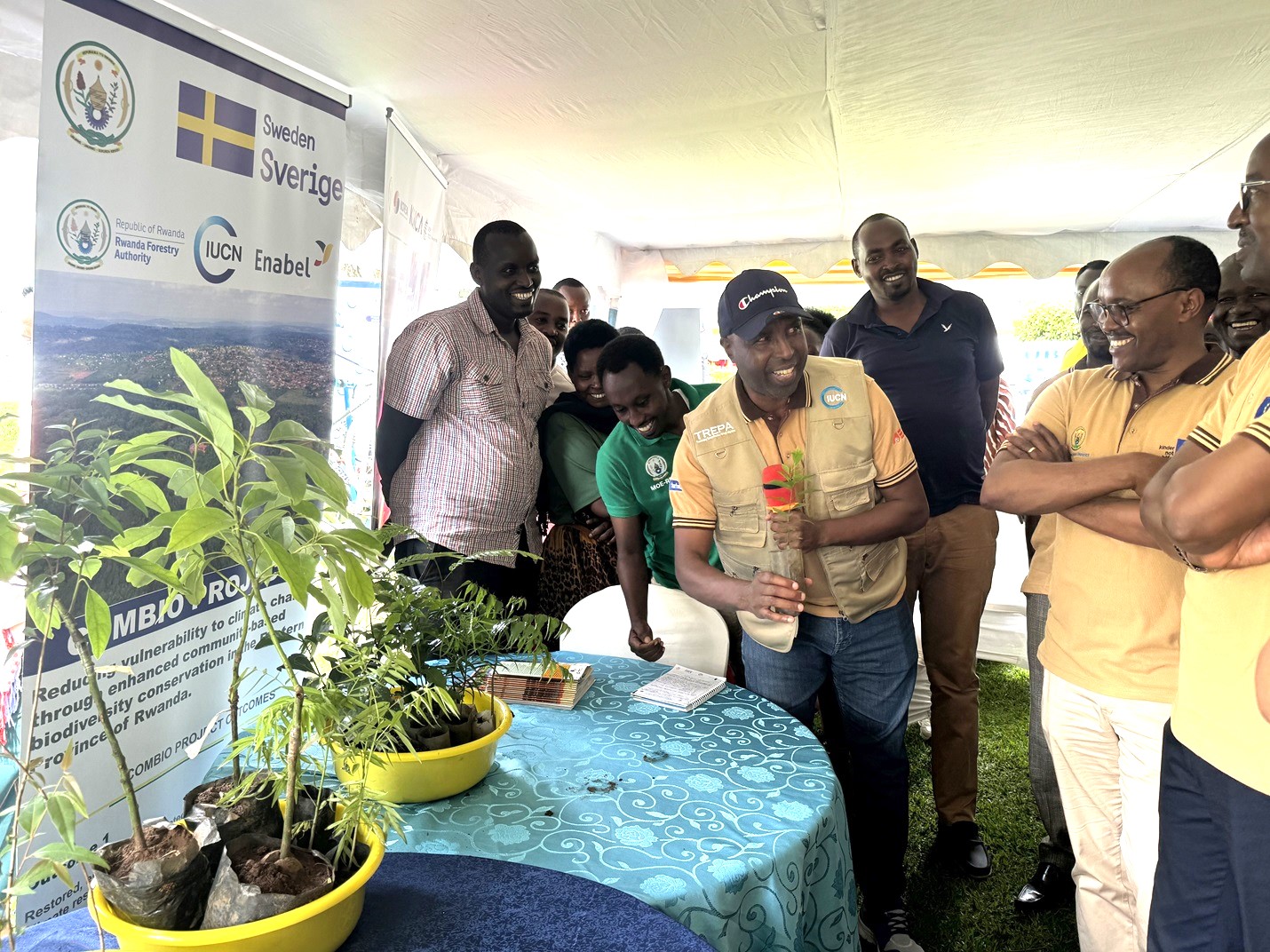Sebeya Project Strengthens Climate Resilience in Rwanda's Western Province
Combating the Sebeya river floods that used to wash away people's properties and claim lives in Rubavu, Nyabihu, Rutsiro and Ngororero Districts has been one of the achievements of the Embedding Integrated Water Resources Management in Rwanda (EWMR) project since 2019.
Why Sebeya catchment was targeted for restoration initiatives
It is well known that Sebeya catchment is one of the water reservoirs of Rwanda from which communities rely on for their livelihoods and other socio-economic transformation activities such as agriculture, access to clean water, irrigation, construction, livestock, hydropower (Keya and Gihira), and industrial use (Bralirwa, Pfunda tea company) among others.
Being an important water reservoir for the country especially for the whole Western Province of Rwanda, Sebeya catchment faced social and environmental challenges such landsides, floods, erosions that washed away people's properties and claimed lives of many people in many parties of Rubavu and Nyabihu Districts. The catchment is steepest slopes, highest mountains and densely populated.
on June 2019 in Rubavu District in Kanama Sector, the Ministry of Environment through Rwanda Water Resources Board (RWB), the former RWFA in collaboration with International Union for Conservation of Nature (IUCN), SNV and RWARRI launched the Embedding Integrated Water Resources Management (EWMR) project, commonly known as Sebeya project by many locals with financial support from Embassy of Kingdom of Netherlands in Rwanda.
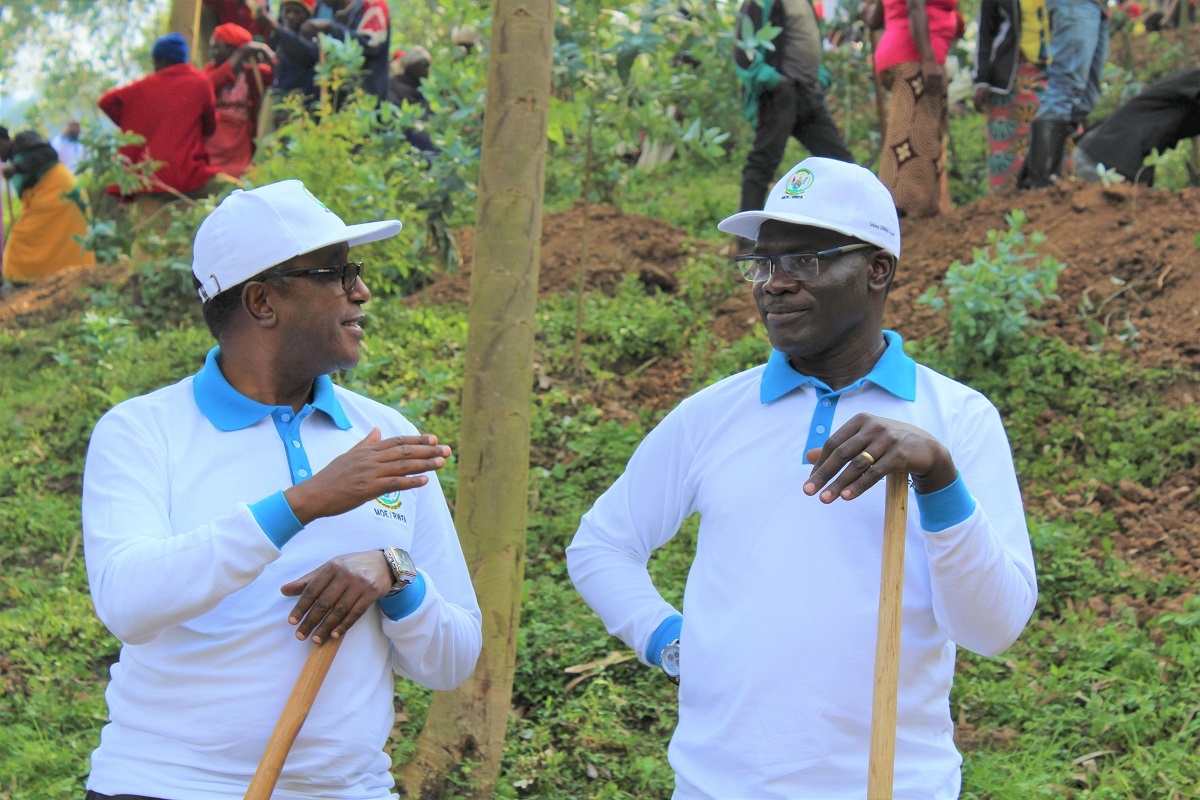 Photo: The former Rwanda’s Minister of Environment Dr. Vicent Biruta, currently Minister of Foreign Affairs and International Cooperation chatting with Luther Anukur, IUCN Regional Director for Eastern and Southern Africa during the launch of EWMR project.
Photo: The former Rwanda’s Minister of Environment Dr. Vicent Biruta, currently Minister of Foreign Affairs and International Cooperation chatting with Luther Anukur, IUCN Regional Director for Eastern and Southern Africa during the launch of EWMR project.
During the launch, thousands of residents from of Rubavu joined the former Rwanda’s Minister of Environment Dr. Vicent Biruta, former Netherlands Ambassador to Rwanda Frederique de Man, Luther Anukur, IUCN Regional Director for Eastern and Southern Africa and Charles Karangwa, the former IUCN Rwanda Country Representative who is now the IUCN Regional Head, Land Systems among other high officials.
The EWMR project goal was and still is to improve catchment management while contributing to increased resilience of communities and landscapes to the impacts of climate change and other drivers. The Sebeya Catchment is shared between Rubavu, Rutsiro, Nyabihu and Ngororero districts.
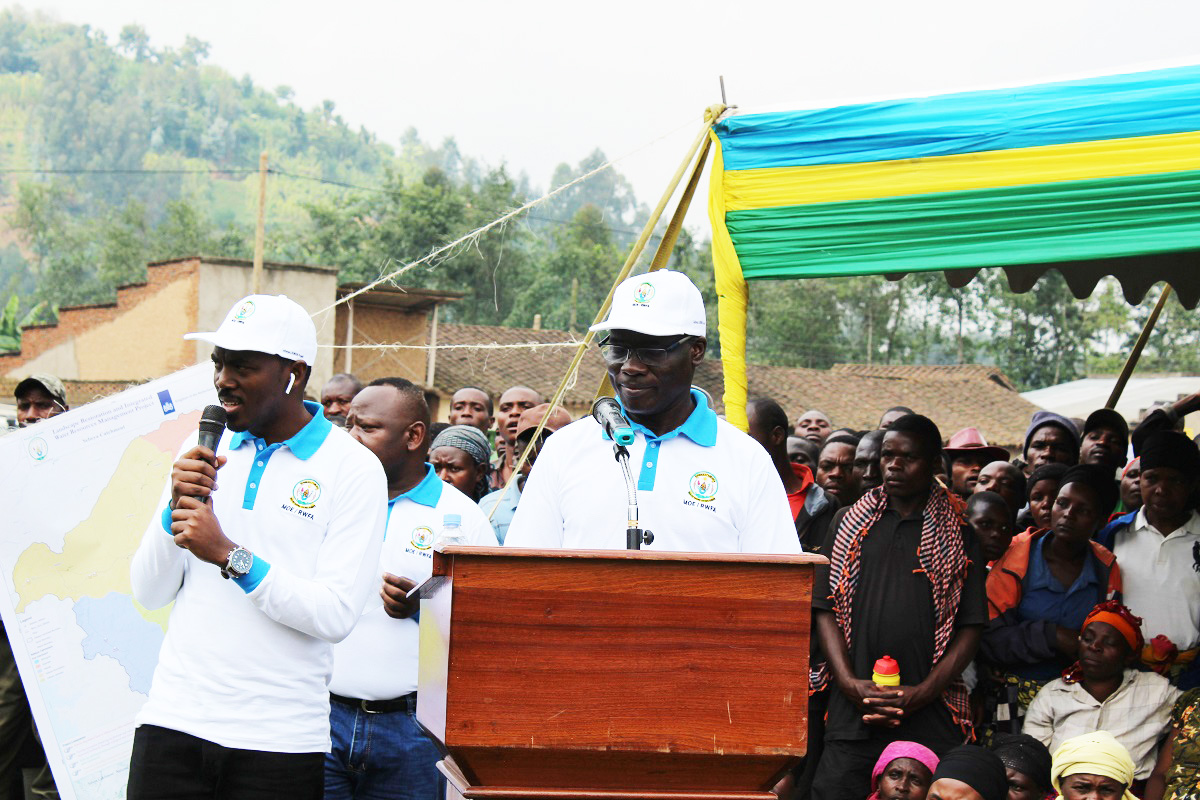 Photo: Charles Karangwa, the former IUCN Rwanda Country Representative who is now IUCN Regional Head, Land Systems during the launch of EWMR project in Kanama sector, Rubavu district in 2019
Photo: Charles Karangwa, the former IUCN Rwanda Country Representative who is now IUCN Regional Head, Land Systems during the launch of EWMR project in Kanama sector, Rubavu district in 2019
EWMR project’s achievements to date
Since 2019, the International Union for Conservation of Nature (IUCN) in partnership with Government of Rwanda through RWB, SNV and RWARRI through community approach across Rubavu, Rutsiro, Nyabihu and Ngororero districts implemented various activities such as radical and progressive terraces, flood mitigation structures, afforestation, agroforestry, as well as providing supporting measures including cows, small livestock, rainwater harvesting, cooking stoves to households and schools, kitchen gardens and Community Environment Conservation Fund (CECF) through Village Saving and Loan Associations, among.
Degraded land restoring activities
• Radical terraces 1,560 hectares
• Progressive terraces 835 hectares
• Trenches in forests 2,820 hectares
• Afforestation 215 hectares
• Agroforestry on 730 hectares
Flood- curbing infrastructures
• Sebeya lateral dyke
• Bukeri diversion channel
• Flood retention walls
• Ongoing Sebeya retention dam
Supporting measures among residents
• 860 cows to the households through the Girinka Program
• 620 Rainwater Harvesting (RWH) tanks to households
• 35 RWH tanks to schools
• 2,180 small livestock
• 155 kitchen gardens
• 3,250 Improved Cooking Stoves (ICS)
• 12 ICS to Schools
• 331 Village Saving and Loans Associations (VSLAs) established, with over 6,000 members of which 58% were women
Beneficiaries speak out
Musafiri Butera, a farmer and one of the beneficiaries of the EWMR project from Bigogwe Sector in Nyabihu District, is pleased that the terraces have been created on his farmland and have proven to be advantageous.
"I and many other people from Bigogwe at first time did not welcome this terracing initiative because we thought they wanted to demolish our lands. We tried to reject it seeing our land becoming very small. I am one of the people who were against terraces," said Butera who owns two hectares on which he grows irish potatoes and grasses for his cows.
"My family and I are now grateful to the EWMR project for constructing terraces in our farms. The landscape restoration initiatives have extremely helped us prevent soil erosion and increase our agricultural yields.”, said Butera.
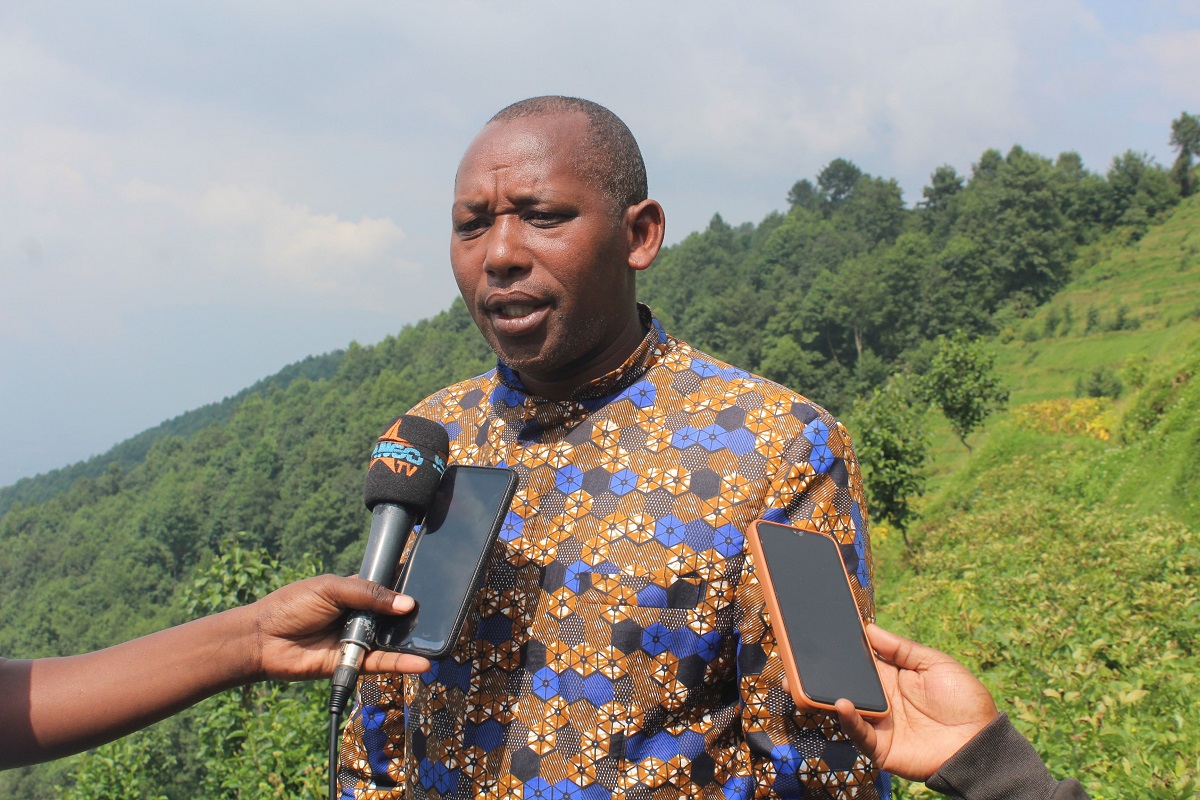 Photo: Musafiri Butera, a farmer and one of the beneficiaries of the EWMR project. Photo Jean Claude HABIMANA
Photo: Musafiri Butera, a farmer and one of the beneficiaries of the EWMR project. Photo Jean Claude HABIMANA
“Floods no longer kill people in Mahoko and Nyundo, they have stopped,” said Esperance Mukarukundo, a resident of Kanama Sector, Rubavu District. We really thankful for IUCN and all partners for having constructed retaining walls, built terraces and improved our crop yields.
Félicien Twagirayezu from Nyabirasi Sector in Rutsiro District has shared how the cow he reived from EWMR project is not only a source of milk, but also a significant aid in combating soil erosion for his family.
" Aside from milk, the cow provided to my family through the EWMR project has assisted me in obtaining manure to fertilized my soil. This has also been a huge help in combating soil erosion, which used to economically affect my family. Furthermore, the yields of crops have improved significantly." He said.
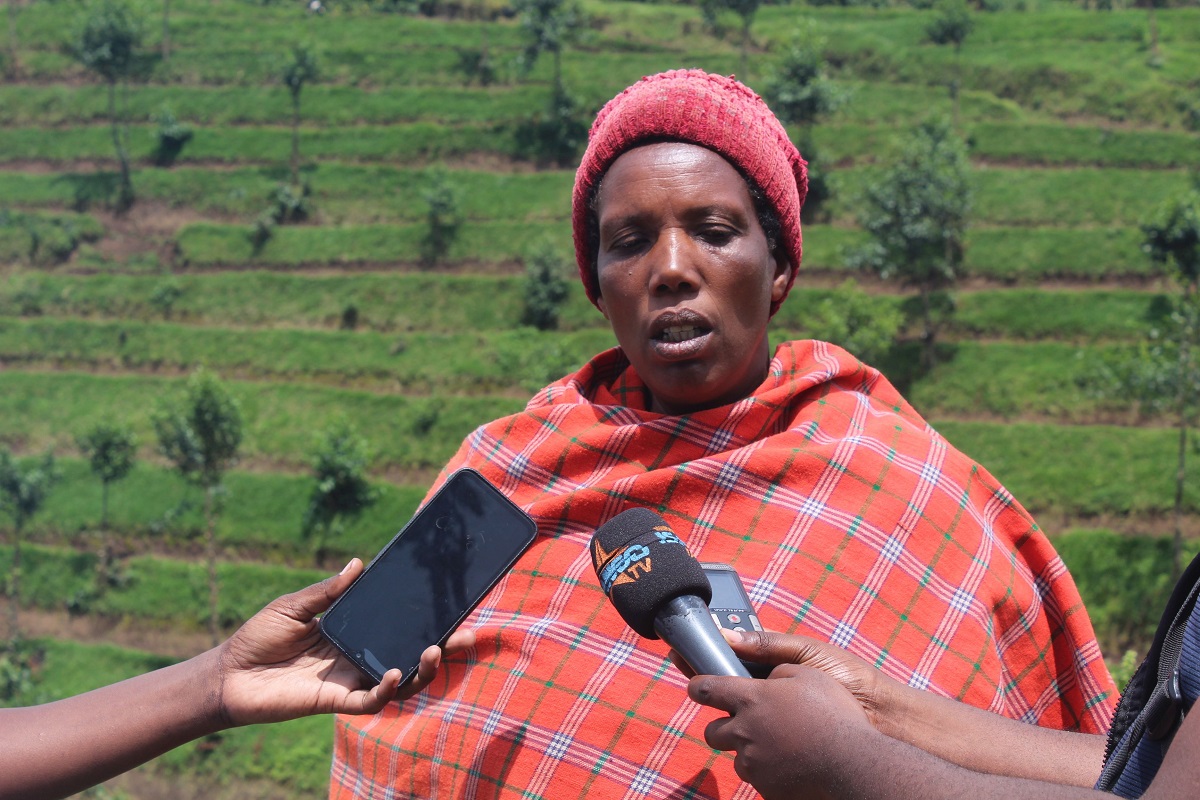 Photo: We really thankful for IUCN and all partners for having built terraces in our farmlands. Photo by Jean Claude HABIMANA
Photo: We really thankful for IUCN and all partners for having built terraces in our farmlands. Photo by Jean Claude HABIMANA
Job Creation
Like other young people, a 29-year-old Niyoyita Thierry is one of the young people who have been able to get employment in the EWMR project which has been implemented in Sebeya catchment since 2019.
In 2020, when COVID 19 affected the world economy, Mr. Niyoyita Thierry, who had been unemployed, became more challenged by the economic crisis.
Fortunately, in the same year, Mr. Niyoyita got employed in the EWMR project.
“I remember It was in 2020 when we were in the lockdown due to COVID-19.” He said.
During this time, the Government of Rwanda decided to reopen some economic activities that were previously closed to contain the spreading of Coronavirus among local communities.
Among the activities that resumed after several time of closure include the EWMR project that helped farmers in the project zone to cope with the economic crisis in their families.
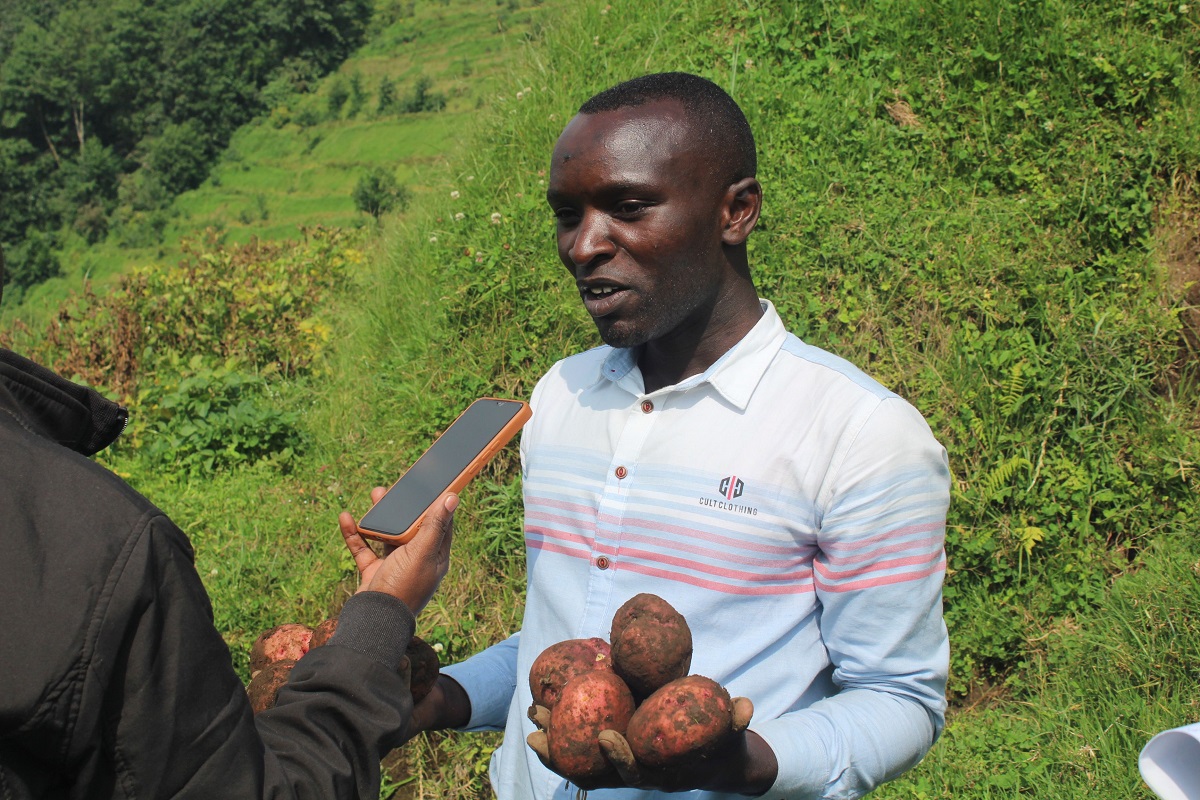 Photo: Thierry is one of the young people who got employment in the EWMR project. Photo Jean Claude HABIMANA
Photo: Thierry is one of the young people who got employment in the EWMR project. Photo Jean Claude HABIMANA
“As youth, we were encouraged to participate in the project implementation.” Niyoyita said.
Since then, Niyoyita got a job that enabled him to get out of poverty and he was able to buy a cow and rent a parcel of land where he started to do farming activities, thanks to the income generated from the employment opportunity.
Mr. Niyoyita believes that even after the Sebeya project he will continue to be successful through agriculture and livestock breeding.
Technical Assistance (TA) led by IUCN
The EWMR project Manager, Albert Schenk at the International Union for Conservation of Nature (IUCN) explained that the community approach has been successfully helping a lot towards addressing the Sebeya river problems.
“What makes this project unique is the ‘community approach’ that has been applied.
The project is designed in a way that the Embassy of the Kingdom of the Netherlands in Rwanda is the funding partner. So, it’s providing the funds that allow Rwanda Water Resources Board as the government leads on this project to support the implementation of the project.
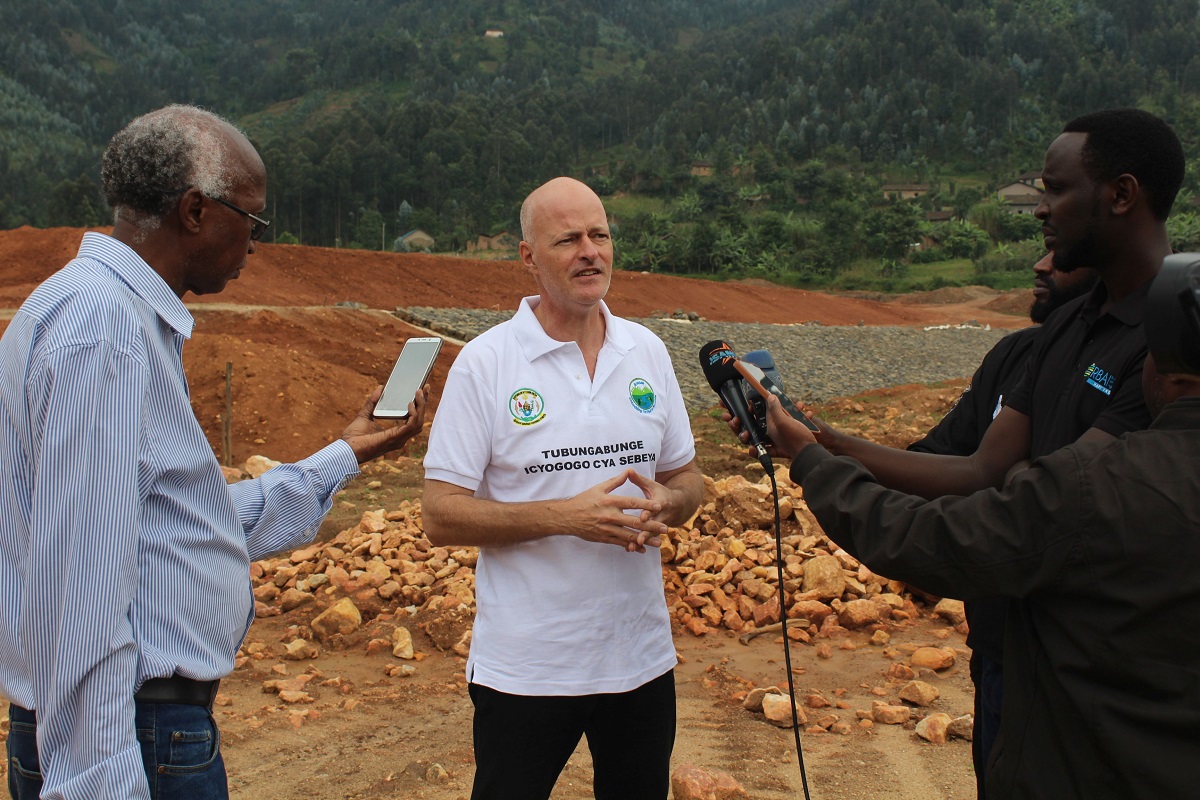 Photo: Albert Schenk, IUCN Rwanda Programme Manager during interview with media. Photo by Jean Claude HABIMANA
Photo: Albert Schenk, IUCN Rwanda Programme Manager during interview with media. Photo by Jean Claude HABIMANA
IUCN together with SNV and RWARRI, we were approached to provide technical assistance for this project. And then specifically IUCN has a lot of experience in forest landscape restoration, nature-based solutions, community approach and also integrated water resource management, while SNV has a lot of experience with livelihood interventions, value chains, etc. So that’s why we brought in SNV and RWARRI, as the local NGO really supported us in engaging the communities and the district authorities under this project.
Fortunately, last year, I was with the Mayor of Rubavu and he said that the year before, basically that the rainy season 2021-2022 was the first year in a long time that there were no human casualties. So, I think that is already proof that the project is really achieving what we aimed to achieve.
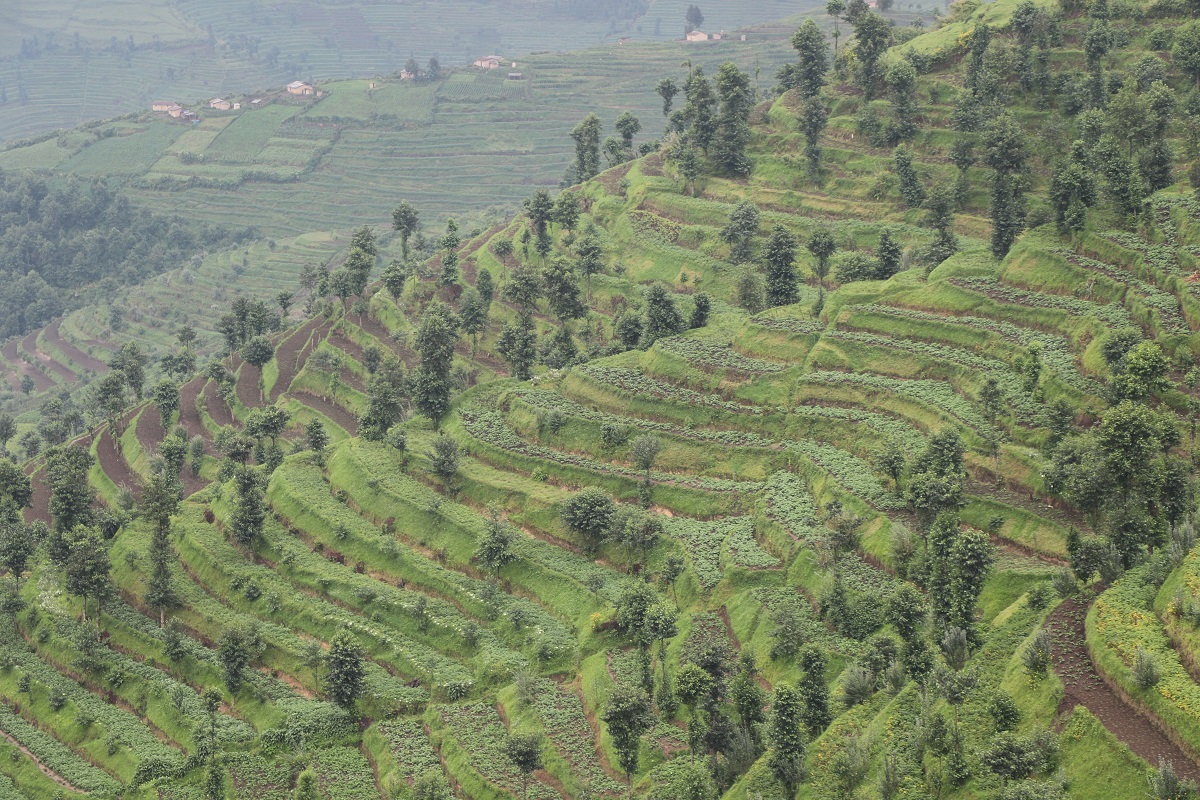 Photo: Radical terraces play a big role in increasing agriculture production and fighting against erosion in Nyabihu. Photo Jean Claude HABIMANA
Photo: Radical terraces play a big role in increasing agriculture production and fighting against erosion in Nyabihu. Photo Jean Claude HABIMANA
IUCN recommendations to the local authorities and local residents
Albert Schenk, IUCN Rwanda Programme Manager: What really makes this project unique is the participatory community approach that is being applied. In the past, such landscape restoration projects were implemented in a different way which were not always very successful because the implementers went to the community to say this is what we come to do for you. Often this project didn’t work out very well.
What we said together with the government of Rwanda and the donor, we said we have to use a different approach under this project. And that is the participatory community approach, which means you go into the communities and say, what are your challenges? What are your specific issues relating to water management, and landscape restoration?
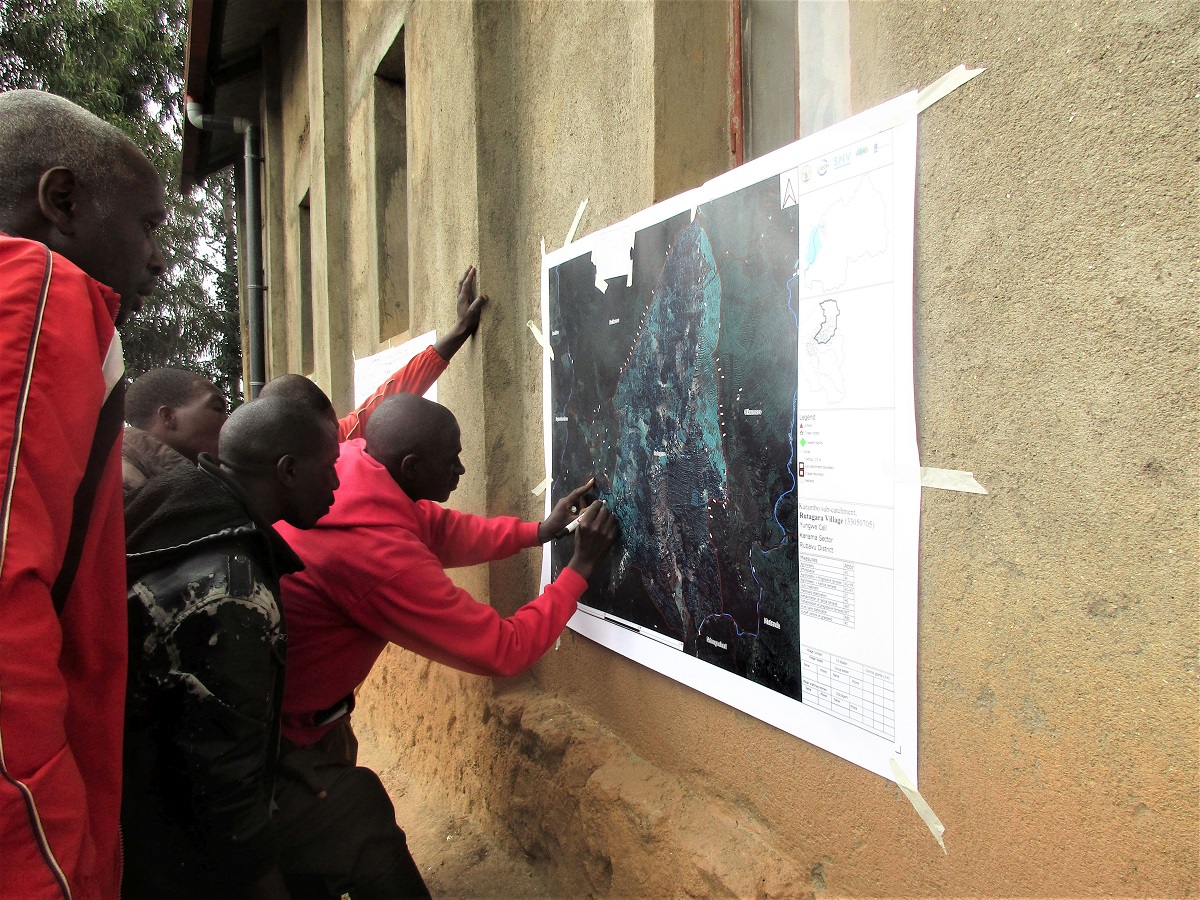 Photo: Participatory Community-Based approaches in mapping Sebeya catchment.
Photo: Participatory Community-Based approaches in mapping Sebeya catchment.
And then the communities they sit together and say, these are the challenges specifically in our project. And this is what we as a community want to recommend to address the challenges.
You get much better information from the ground on what the issues are, how they could be addressed? And then together with the communities you actually implement those interventions that the communities themselves have proposed, and therefore you also get much more ownership within the communities of the interventions that you do.
But one main challenge specifically not addressed by this project is the mining that is going on in the Sebeya river, mining for sand and minerals. It contributes a lot to the brown color of the river.
In addition to the landscape restoration and integrated water resources management, the Government of Rwanda also should look at how to improve mining practices in Sebeya and other catchments to really get water clean, and very safe for people.
Furthermore, Albert observes the positive impacts that this project has brought to the community and the results are excellent, and thus its expansion to other parts of Rwanda could be more impactful in improving the quality of life.
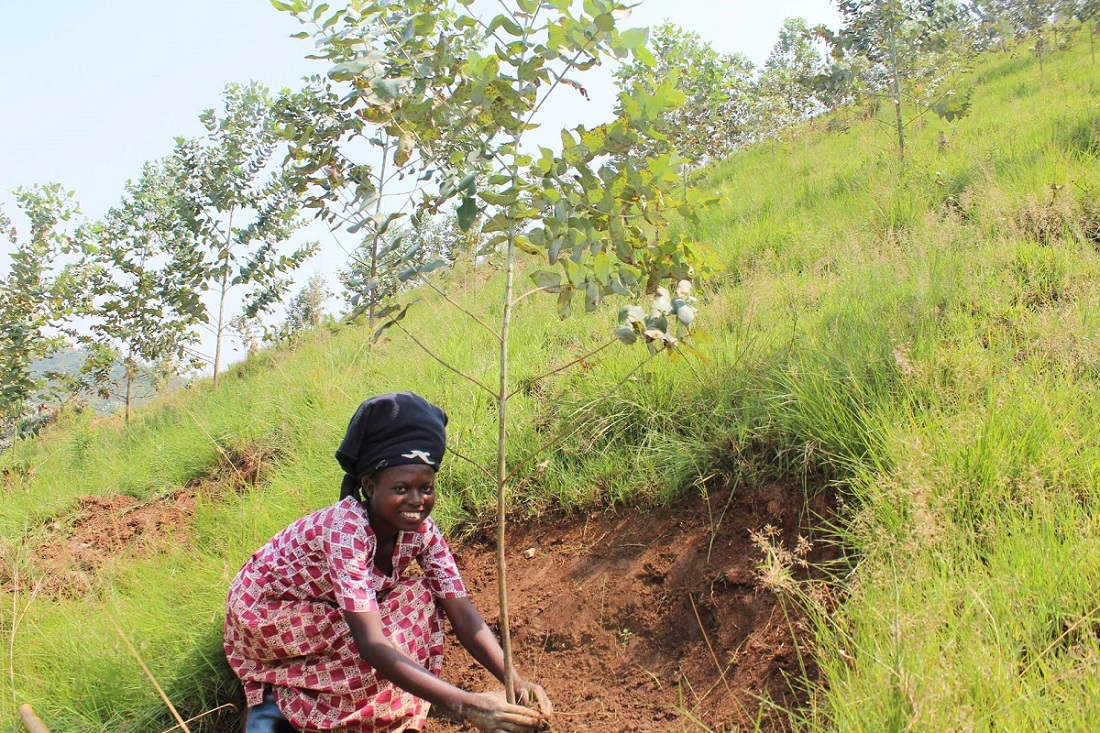 Photo: Over 215 hectares of afforestation are currently restored. Photo by Jean Claude HABIMANA
Photo: Over 215 hectares of afforestation are currently restored. Photo by Jean Claude HABIMANA
Local leaders speak out and emphasize on the community approach model
Antoinette Mukandayisenga, the Mayor of Nyabihu District appreciated and recommended the community approach to have more projects implemented.
Before the start of the project, many people here were faced with the problem of rain that washed away the lands due to the highest slope and damaged the crops in the sectors of Bigogwe, Rambura and Muringa.
 Photo: Antoinette Mukandayisenga, the Mayor of Nyabihu District. Photo Jean Claude HABIMANA
Photo: Antoinette Mukandayisenga, the Mayor of Nyabihu District. Photo Jean Claude HABIMANA
“This project’s results are high, as some of the challenges we used to face have been removed.
There are about 141 hectares of terraces as one of the gains in our district. Farmers have started to record the highest productivity where terraces have been established”, she said.
In addition to the terrace activities, Mrs. Mukandayisenga says that the residents have been given jobs which enabled them to buy additional livestock to which they have been given where 79 cows, and over 280 small animals were distributed among the vulnerable families to improve their livelihoods.
Mrs. Mukandayisenga confirmed that the Sebeya project was well planned because the local community participated so that its actions did not contravene their expectations.
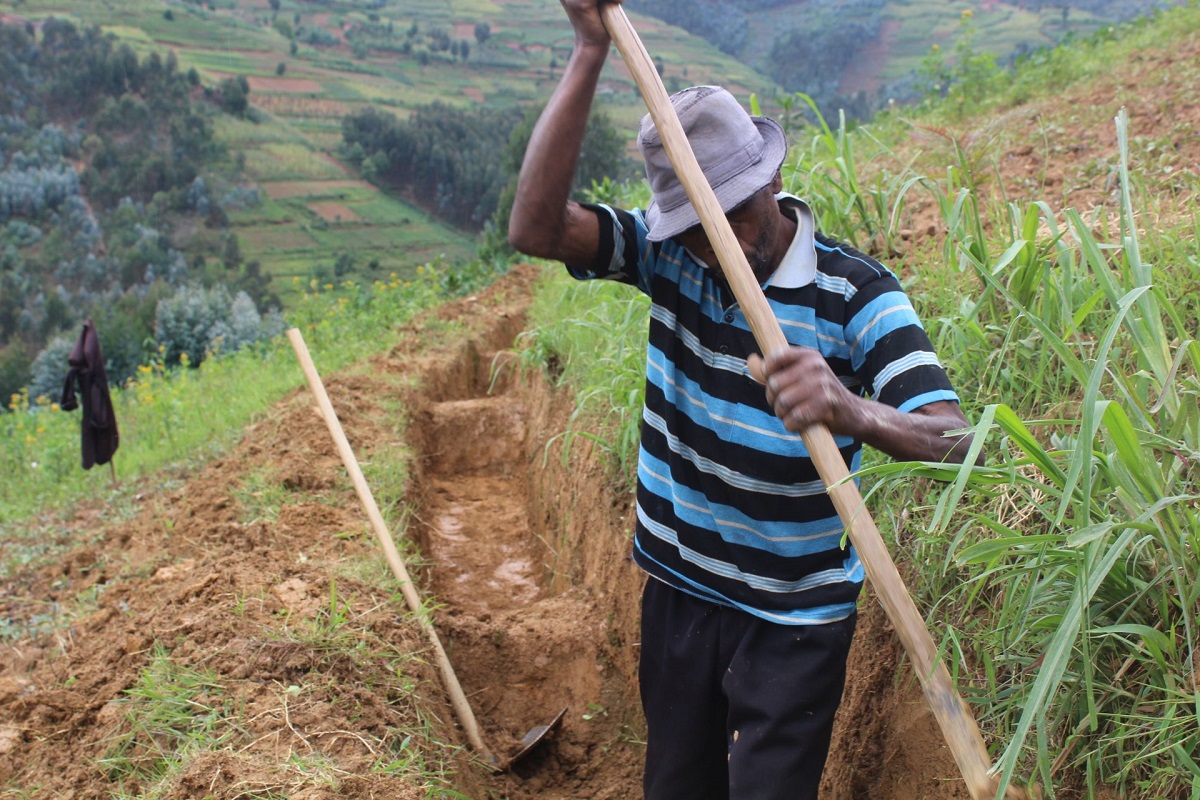 Photo: Over 2,820 hectares of trenches in forests were created
Photo: Over 2,820 hectares of trenches in forests were created
“The way the project was implemented was not dictated to local communities, but there was a participatory approach where they have been able to express their concerns throughout the project implementation.”
“This means that the people were consulted in what was done, the district is proud that the people working in the project knew how to make terraces, which is the answer to the problem.” She said
According to the Mayor this project does not end as it left the local communities with the knowledge to make terraces so that they will be able to repair them when they are damaged or construct the new ones where they are not.
“Even though making terraces is expensive, a citizen can get together with others and do it.” She said,
Nyabihu District Mayor assures that the legacy of the Sebeya project will remain as its activities are in line with the country’s vision for sustainable development.
Havugimana Etienne, the Vice Mayor in charge of the economic Development in Rutsiro District said “It is true that the EWMR project has helped us a lot in the District.”
Mr. Havugimana noted that the District still has other places which need attention.
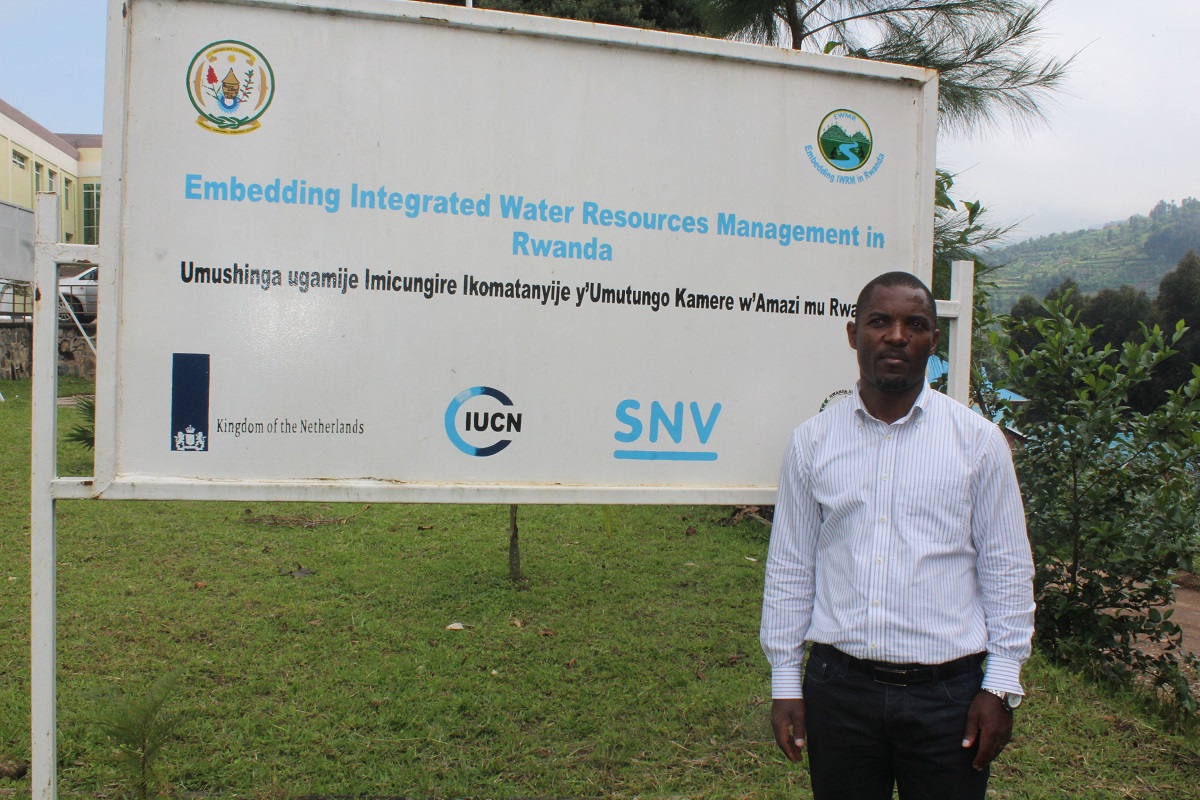 Photo: Havugimana Etienne, the Vice Mayor in charge of the economic Development in Rutsiro District. Photo by Jean Claude HABIMANA
Photo: Havugimana Etienne, the Vice Mayor in charge of the economic Development in Rutsiro District. Photo by Jean Claude HABIMANA
“We still have many places which need project like EWMR project. We are still doing advocacy. Maybe an extension would help us and our people.” He added,
“You know that our District is mountainous and agricultural; So, you can see that when we join together to fight erosion, we increase productivity and, in that time, we kill two birds with one stone.” He explained.
Rwanda Water Resources Board (RWB) has assured that Sebeya river is no longer a threat to residents of Western Province as its catchment was restored and protected to avoid any further floods and damage.
According to RWB, the river is not a threat anymore to residents of Rubavu, Nyabihu and Rutsiro Districts, thanks to the Sebeya project.
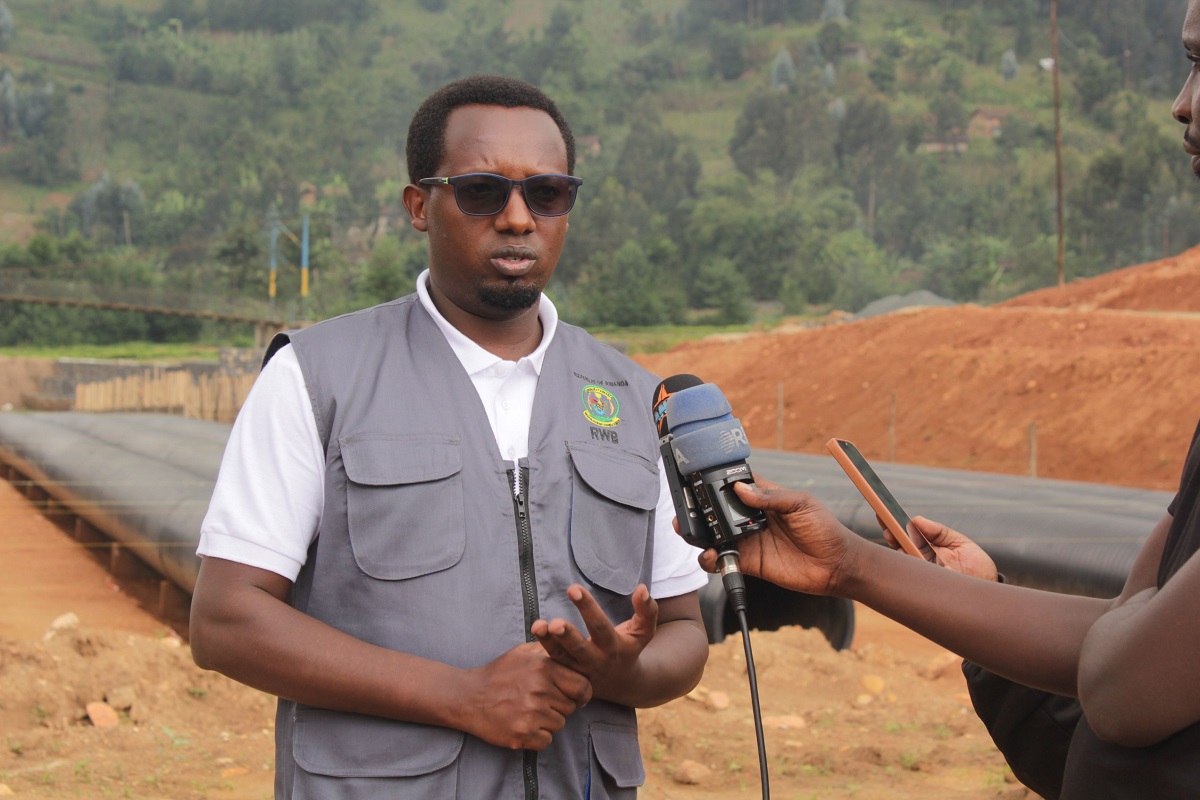 Photo: Dr Emmanuel Rukundo, the Director General of the Rwanda Water Resources Board (RWB) during interview with media. Photo by Jean Claude HABIMANA
Photo: Dr Emmanuel Rukundo, the Director General of the Rwanda Water Resources Board (RWB) during interview with media. Photo by Jean Claude HABIMANA
Radical terracing, agroforestry, afforestation, dams and dykes have been put in place along with 6,000 community members’ involvement towards finding a long-lasting solution to the Sebeya River's flooding.
“Floods have been fully addressed as no more problems are being recorded since the last two years in parts of Mahoko and Nyundo which used to be flooded a lot. But the journey for catchment restoration continues since increasing afforestation and terraces are still needed,” Dr Emmanuel Rukundo, the Director General of the Rwanda Water Resources Board (RWB) said.
National and International media participated a lot in EWMR project
Grassroots and administrative Perceptions of the Sebeya Project’s Impact on Community Wellbeing and economic aspect in Nyabihu District.
Rwanda-Projet Sebeya : Les désastres maîtrisés
End of woes in sight for farmers affected by Sebeya River floods
8,000 farmers secure jobs to address Sebeya River floods
Sebeya River no longer threat to community – Water board
SEBEYA RIVER CONSERVATION PROJECT BRINGS HOPE AMONG BENEFICIARIES
https://www.ktpress.rw/2020/04/sebeya-river-conservation-project-brings-hope-among-beneficiaries/
Multibillion dams to curb floods in Western Province
Relief as Rwf22bn effort to preserve Sebeya, other catchments is unveiled
Officials Say Sebeya River Flooding Problem Is Almost Solved
Sebeya Project Beneficiaries call for the Project Extension to eradicate soil erosion and poverty
How radical terraces boost food security in Western Province
TOP 5 Environmental projects that continue to change lives of local communities in Rwanda
Kubungabunga Umugezi wa Sebeya by RTV
Rubavu: Sebeya catchment Conservation project beneficiaries get life changing cows
Other stories
- https://www.newtimes.co.rw/article/4385/news/agriculture/how-radical-terraces-boost-food-security-in-western-province
- https://www.newtimes.co.rw/article/4568/news/environment/sebeya-river-no-longer-threat-to-community---water-board
- https://www.isangostar.rw/kubungabunga-icyogogo-cya-sebeya-byahinduye-imibereho-yabaturage
- https://mobile.igihe.com/amakuru/u-rwanda/article/uko-umushinga-wo-kubungabunga-sebeya-wahaye-agahenge-abatuye-nyabihu-na-rubavu
- https://www.youtube.com/watch?v=ZwccV8K573Y
- https://igihe.com/ibidukikije/ibungabunga/article/rubavu-umugezi-wa-sebeya-wimuraga-abaturage-umaze-kuba-ishingiro-ry-ubuzima
- https://en.igihe.com/news/article/river-sebeya-catchment-area-residents-receive-138-water-reservoirs
- https://spandrel.rw/rwf-22-billion-to-preserve-sebeya-river
- https://www.newtimes.co.rw/article/183548/News/18000-ha-under-risk-of-soil-erosion-around-sebeya-river-on-course-to-be-restored
- https://www.newtimes.co.rw/article/176505/News/rwf10-billion-earmarked-for-conservation-of-sebeya-river-catchment-area
- https://www.newtimes.co.rw/article/4385/news/agriculture/how-radical-terraces-boost-food-security-in-western-province
- https://www.newtimes.co.rw/article/183915/News/will-proposed-rwf75-billion-dams-curb-sebeya-river-floods
- https://www.newtimes.co.rw/article/184640/News/sebeya-catchment-partners-to-set-up-conservation-fund-for-flood-control
- https://www.topafricanews.com/2020/11/06/sebeyas-previous-care-plan-leads-to-the-smooth-progress-of-catchment-rehabilitation-activities/
- https://www.topafricanews.com/2021/03/12/imbaraga-farmers-organization-rwarri-express-optimism-in-the-long-term-impacts-of-sebeya-catchment-conservation/
- https://www.topafricanews.com/2021/08/11/sebeya-river-no-longer-a-threat-to-community-rather-a-source-of-economic-development/
- https://www.topafricanews.com/2021/11/24/video-restoring-rwandas-sebeya-catchment-for-people-and-nature/
- https://www.topafricanews.com/2022/05/11/2019-2022-what-are-the-feelings-of-citizens-who-were-once-devastated-by-sebeya-river-flooding/
- https://www.topafricanews.com/2022/10/24/how-local-communities-restored-degraded-sebeya-catchment-in-rwanda/
- https://www.topafricanews.com/2023/01/19/officials-say-sebeya-river-flooding-problem-is-almost-solved/
- https://www.topafricanews.com/2021/03/05/rutsiro-29-beneficiaries-of-sebeya-project-receive-cows-as-part-of-livelihood-transformation/
The four- year EWMR project (2019-2023) was implemented by
With financial support from
Disclaimer
Opinions expressed in posts featured on any Crossroads or other blogs and in related comments are those of the authors and do not necessarily reflect the opinions of IUCN or a consensus of its Member organisations.
IUCN moderates comments and reserves the right to remove posts that are deemed inappropriate, commercial in nature or unrelated to blog posts.
